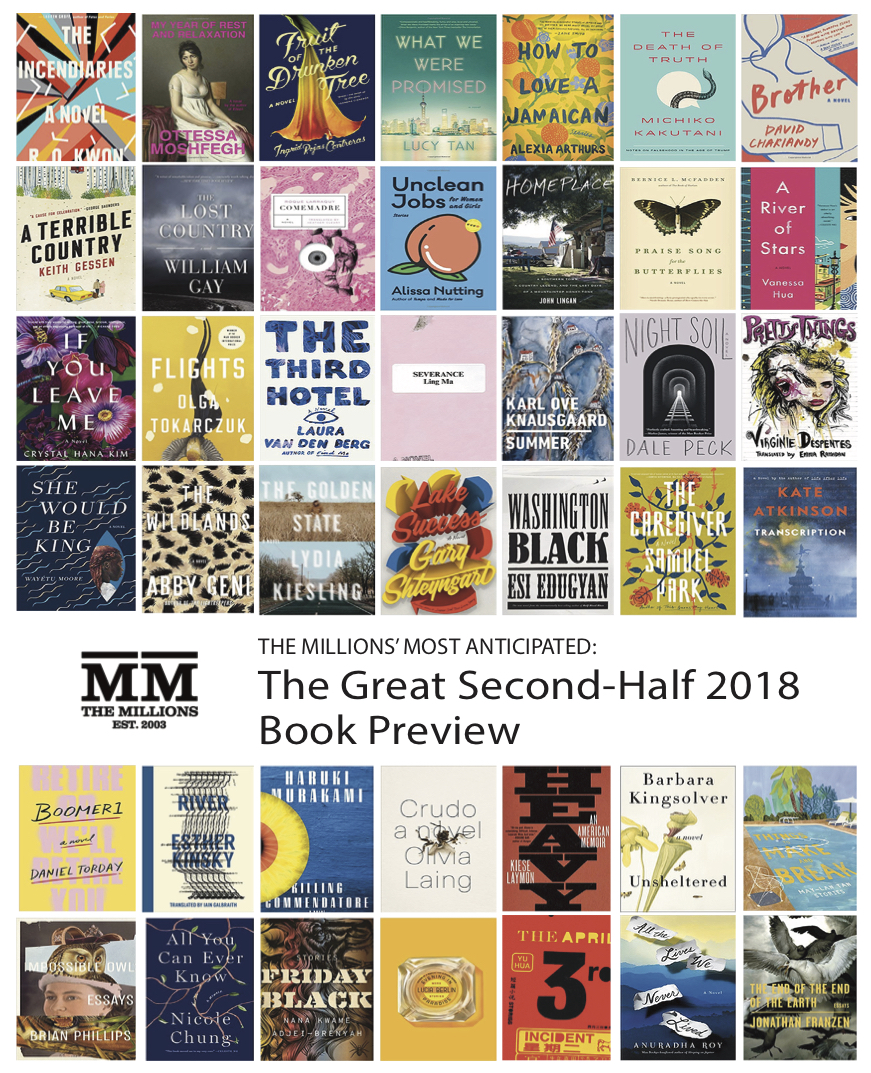We wouldn’t dream of abandoning our vast semi–annual Most Anticipated Book Previews, but we thought a monthly reminder would be helpful (and give us a chance to note titles we missed the first time around). Here’s what we’re looking out for this month. Find more September titles at our Great Second-Half Preview, and let us know what you’re looking forward to in the comments!
 Transcription by Kate Atkinson: As a fangirl of both the virtuosic Life After Life and of her Jackson Brody detective novels, I barely need to see a review to get excited about a new Atkinson novel—especially a period novel about a female spy, recruited by MI5 at age 18 to monitor fascist sympathizers. Nonetheless, here’s some love from Booklist (starred review): “This is a wonderful novel about making choices, failing to make them, and living, with some degree of grace, the lives our choices determine for us.” (Sonya)
Transcription by Kate Atkinson: As a fangirl of both the virtuosic Life After Life and of her Jackson Brody detective novels, I barely need to see a review to get excited about a new Atkinson novel—especially a period novel about a female spy, recruited by MI5 at age 18 to monitor fascist sympathizers. Nonetheless, here’s some love from Booklist (starred review): “This is a wonderful novel about making choices, failing to make them, and living, with some degree of grace, the lives our choices determine for us.” (Sonya)
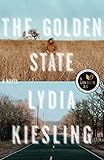 The Golden State by Lydia Kiesling: File The Golden State under “most most-anticipated” as it’s the first novel of The Millions’ own brilliant and beloved Lydia Kiesling, who has has been wielding her pen and editorial prowess on this site for many a year. Two months pre-pub, The Golden State is already off to the races with a nomination for the Center for Fiction’s First Novel Prize and a starred review from Publisher’s Weekly, stating, “Kiesling depicts parenting in the digital age with humor and brutal honesty and offers insights into language, academics, and even the United Nations.” Kiesling herself has written that “great writing is bracing, and makes you feel like making something of your own, either another piece of writing, or a joyful noise unto the Lord.” The Golden State promises just that. (Anne)
The Golden State by Lydia Kiesling: File The Golden State under “most most-anticipated” as it’s the first novel of The Millions’ own brilliant and beloved Lydia Kiesling, who has has been wielding her pen and editorial prowess on this site for many a year. Two months pre-pub, The Golden State is already off to the races with a nomination for the Center for Fiction’s First Novel Prize and a starred review from Publisher’s Weekly, stating, “Kiesling depicts parenting in the digital age with humor and brutal honesty and offers insights into language, academics, and even the United Nations.” Kiesling herself has written that “great writing is bracing, and makes you feel like making something of your own, either another piece of writing, or a joyful noise unto the Lord.” The Golden State promises just that. (Anne)
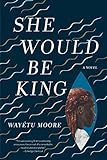 She Would Be King by Wayétu Moore: It’s the early years of Liberia, and three strangers with nothing in common help smooth the way for the nation. Gbessa is a West African exile who survives certain death; June Dey is running from a Virginia plantation; Norman Aragon, the son of a colonizer and a slave, can disappear at will. Their story stands at the meeting point of the diaspora, history, and magical realism, and Edwidge Danticat calls the novel “beautiful and magical.” (Kaulie)
She Would Be King by Wayétu Moore: It’s the early years of Liberia, and three strangers with nothing in common help smooth the way for the nation. Gbessa is a West African exile who survives certain death; June Dey is running from a Virginia plantation; Norman Aragon, the son of a colonizer and a slave, can disappear at will. Their story stands at the meeting point of the diaspora, history, and magical realism, and Edwidge Danticat calls the novel “beautiful and magical.” (Kaulie)
 Washington Black by Esi Edugyan: Edugyan’s last novel, Half-Blood Blues, won the Scotiabank Giller Prize and was a finalist for the Man Booker. Attica Locke calls this one “nothing short of a masterpiece.” When Wash, an 11-year-old enslaved in Barbados, is chosen as a manservant, he is terrified. The chooser, Christopher Wilde, however, turns out to be a naturalist, explorer, and abolitionist. But soon Wash and Christopher find themselves having to escape to save their lives. Their run takes them from the frozen North to London and Morocco. It’s all based on a famous 19th-century criminal case. (Claire)
Washington Black by Esi Edugyan: Edugyan’s last novel, Half-Blood Blues, won the Scotiabank Giller Prize and was a finalist for the Man Booker. Attica Locke calls this one “nothing short of a masterpiece.” When Wash, an 11-year-old enslaved in Barbados, is chosen as a manservant, he is terrified. The chooser, Christopher Wilde, however, turns out to be a naturalist, explorer, and abolitionist. But soon Wash and Christopher find themselves having to escape to save their lives. Their run takes them from the frozen North to London and Morocco. It’s all based on a famous 19th-century criminal case. (Claire)
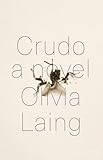 Crudo by Olivia Laing: Olivia Laing, known for her chronicles of urban loneliness and writers’ attraction to drink as well as critical writing on art and literature, jumps genres with her first novel, Crudo. It’s a spitfire of a story with a fervent narrator and a twist: The book is written in the voice of punk feminist author Kathy Acker performed in mash-up with Laing’s own, as she considers marriage (with equivocation) and the absurdity of current events circa 2017. Suzanne Moore at The Guardian says, “Here [Laing] asks how we might not disappear…She reaches out for something extraordinary. Crudo is a hot, hot book.” (Anne)
Crudo by Olivia Laing: Olivia Laing, known for her chronicles of urban loneliness and writers’ attraction to drink as well as critical writing on art and literature, jumps genres with her first novel, Crudo. It’s a spitfire of a story with a fervent narrator and a twist: The book is written in the voice of punk feminist author Kathy Acker performed in mash-up with Laing’s own, as she considers marriage (with equivocation) and the absurdity of current events circa 2017. Suzanne Moore at The Guardian says, “Here [Laing] asks how we might not disappear…She reaches out for something extraordinary. Crudo is a hot, hot book.” (Anne)
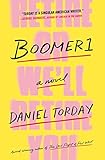 Boomer1 by Daniel Torday: Daniel Torday follows his acclaimed debut, The Last Flight of Poxl West, with a second novel that carries a menacing subtitle: Retire or We’ll Retire You. It’s apt because this is the story of a millennial loser named Mark Brumfeld, a bluegrass musician, former journalist, and current grad student whose punk bassist girlfriend rejects his marriage proposal, driving him out of New York and back to his parents’ basement in suburban Baltimore. There, under the titular handle of Boomer1, he starts posting online critiques of baby boomers that go viral. Intergenerational warfare—what a smart lens for looking at the way we live today. (Bill)
Boomer1 by Daniel Torday: Daniel Torday follows his acclaimed debut, The Last Flight of Poxl West, with a second novel that carries a menacing subtitle: Retire or We’ll Retire You. It’s apt because this is the story of a millennial loser named Mark Brumfeld, a bluegrass musician, former journalist, and current grad student whose punk bassist girlfriend rejects his marriage proposal, driving him out of New York and back to his parents’ basement in suburban Baltimore. There, under the titular handle of Boomer1, he starts posting online critiques of baby boomers that go viral. Intergenerational warfare—what a smart lens for looking at the way we live today. (Bill)
 The Lost Art of Reading by David Ulin: In the book, David delves into the current political and cultural milieu, ultimately offering a hopeful message: “Why should we fear one another’s stories? The true act of resistance is to respond with hope. All those voices are what connect us. In a culture intent on keeping us divided, they are, they have been always, the necessary narrative.” (Edan)
The Lost Art of Reading by David Ulin: In the book, David delves into the current political and cultural milieu, ultimately offering a hopeful message: “Why should we fear one another’s stories? The true act of resistance is to respond with hope. All those voices are what connect us. In a culture intent on keeping us divided, they are, they have been always, the necessary narrative.” (Edan)
 The Shape of Ruins by Juan Gabriel Vasquez (translated by Anne McLean): In this, his sixth novel in English translation, Colombian writer Juan Gabriel Vasquez plays mischief with history, a string of murders, and the conspiracy theories that commonly arise alongside. Add a storyline carried by a duet of narrators—one with a healthy dollop of paranoia, the other with a fixation for real crime so engrossing he’s turned his home into a kind of museum of crime noir—and you’ve got a gripping read and a solid reflection on the appeal of conspiracy. (Il’ja)
The Shape of Ruins by Juan Gabriel Vasquez (translated by Anne McLean): In this, his sixth novel in English translation, Colombian writer Juan Gabriel Vasquez plays mischief with history, a string of murders, and the conspiracy theories that commonly arise alongside. Add a storyline carried by a duet of narrators—one with a healthy dollop of paranoia, the other with a fixation for real crime so engrossing he’s turned his home into a kind of museum of crime noir—and you’ve got a gripping read and a solid reflection on the appeal of conspiracy. (Il’ja)
 The Silence of the Girls by Pat Barker: Barker is best known for her fantastic World War I Regeneration trilogy, including The Ghost Road, winner of the 1995 Booker Prize. The Silence of the Girls sees Barker casting her historical imagination back further, to Ancient Greece and the Trojan War. Captured by Achilles, Briseis goes from queen to concubine, from ruler to subject—in this retelling of The Iliad, Barker reclaims Briseis as a protagonist, giving authorial voice to her and the other women who have long existed only as powerless subjects in a male epic. (Adam)
The Silence of the Girls by Pat Barker: Barker is best known for her fantastic World War I Regeneration trilogy, including The Ghost Road, winner of the 1995 Booker Prize. The Silence of the Girls sees Barker casting her historical imagination back further, to Ancient Greece and the Trojan War. Captured by Achilles, Briseis goes from queen to concubine, from ruler to subject—in this retelling of The Iliad, Barker reclaims Briseis as a protagonist, giving authorial voice to her and the other women who have long existed only as powerless subjects in a male epic. (Adam)
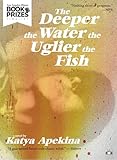 The Deeper the Water the Uglier the Fish by Katya Apekina: Edie finds her mother Marianne in the living room only just surviving a suicide attempt, while her sister Mae is upstairs in a trance. Marianne is committed to a mental hospital, and the sisters are sent to live with their father, far from their native Louisiana. But as they spend more time with their father, the girls grow further apart, torn by their deep loyalty to opposite parents and their own grief and confusion. Apekina’s debut novel plays with tricky family relationships and the way fact and fantasy, loyalty and obsession, can be so difficult to tease apart. (Kaulie)
The Deeper the Water the Uglier the Fish by Katya Apekina: Edie finds her mother Marianne in the living room only just surviving a suicide attempt, while her sister Mae is upstairs in a trance. Marianne is committed to a mental hospital, and the sisters are sent to live with their father, far from their native Louisiana. But as they spend more time with their father, the girls grow further apart, torn by their deep loyalty to opposite parents and their own grief and confusion. Apekina’s debut novel plays with tricky family relationships and the way fact and fantasy, loyalty and obsession, can be so difficult to tease apart. (Kaulie)
 Ordinary People by Diana Evans: The third novel from Evans, the inaugural winner of the Orange Prize for New Writers, Ordinary People follows two troubled couples as they make their way through life in London. The backdrop: Obama’s 2008 election. The trouble: Living your 30s is hard, parenthood is harder, and relationships to people and places change, often more than we’d like them to. But Evans is as sharply funny—in clear-eyed, exacting fashion—as she is sad, and Ordinary People cuts close to the quick of, well, ordinary people. (Kaulie)
Ordinary People by Diana Evans: The third novel from Evans, the inaugural winner of the Orange Prize for New Writers, Ordinary People follows two troubled couples as they make their way through life in London. The backdrop: Obama’s 2008 election. The trouble: Living your 30s is hard, parenthood is harder, and relationships to people and places change, often more than we’d like them to. But Evans is as sharply funny—in clear-eyed, exacting fashion—as she is sad, and Ordinary People cuts close to the quick of, well, ordinary people. (Kaulie)
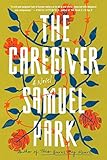 The Caregiver by Samuel Park: Park’s third novel takes place in Rio de Janeiro and California. Mara is an immigrant whose beloved mother Ana, a voice-over actress, was involved with a civilian rebel group in Rio. In California as an adult now, Mara works as a caregiver to a young woman with stomach cancer and grapples with her mother’s complicated, enigmatic past. Shortly after finishing the novel in 2017, Park himself died of stomach cancer at age 41. (Sonya)
The Caregiver by Samuel Park: Park’s third novel takes place in Rio de Janeiro and California. Mara is an immigrant whose beloved mother Ana, a voice-over actress, was involved with a civilian rebel group in Rio. In California as an adult now, Mara works as a caregiver to a young woman with stomach cancer and grapples with her mother’s complicated, enigmatic past. Shortly after finishing the novel in 2017, Park himself died of stomach cancer at age 41. (Sonya)
 Sea Prayer by Khaled Hosseini (illustrated by Dan Williams): Hosseini, author of The Kite Runner, has written a short, illustrated book about the refugee crisis. Told from the perspective of a scared Syrian father to his son as they prepare to leave for Europe, Kirkus’s starred review calls the book “an emotional gut-punch…an excruciating one.” (Carolyn)
Sea Prayer by Khaled Hosseini (illustrated by Dan Williams): Hosseini, author of The Kite Runner, has written a short, illustrated book about the refugee crisis. Told from the perspective of a scared Syrian father to his son as they prepare to leave for Europe, Kirkus’s starred review calls the book “an emotional gut-punch…an excruciating one.” (Carolyn)
 The Piranhas by Roberto Saviano: An explosive novel about the Neapolitan underworld by the author of the nonfiction book Gomorrah, a publishing event that caused the author to go into hiding (where he lives and writes still).
The Piranhas by Roberto Saviano: An explosive novel about the Neapolitan underworld by the author of the nonfiction book Gomorrah, a publishing event that caused the author to go into hiding (where he lives and writes still).
 Patient X: The Case-Book of Ryūnosuke Akutagawa by David Peace: A biographical novel about the master writer Ryūnosuke Akutagawa from the Granta Young British novelist who wrote the Red Riding quartet. According to a Guardian review, his latest is “a novel composed of 12 stories which retell incidents from the life and work of the writer who lived from 1892 to 1927 and is often referred to as the father of the Japanese short story; he is renowned in the west as the author of “In a Grove”, which was the basis for Akira Kurosawa’s film Rashōmon.” (Lydia)
Patient X: The Case-Book of Ryūnosuke Akutagawa by David Peace: A biographical novel about the master writer Ryūnosuke Akutagawa from the Granta Young British novelist who wrote the Red Riding quartet. According to a Guardian review, his latest is “a novel composed of 12 stories which retell incidents from the life and work of the writer who lived from 1892 to 1927 and is often referred to as the father of the Japanese short story; he is renowned in the west as the author of “In a Grove”, which was the basis for Akira Kurosawa’s film Rashōmon.” (Lydia)
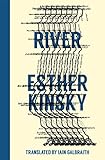 River by Esther Kinsky (translated by Iain Galbraith): One of the unsung attractions of London is the transitional areas at the edges, where city meets country meets industry meets waterfowl meets isolated immigrant laborer. A book in which scarcely anything ever happens, River is, however, filled with life. Resolute in her take on the terrain as the outsider looking in, Kinsky skillfully chronicles the importance in our lives of the homely, the unobserved and the irrepressibly present. A book for those who would gladly reread W.G. Sebald but wish he had written about people more often. (Il’ja)
River by Esther Kinsky (translated by Iain Galbraith): One of the unsung attractions of London is the transitional areas at the edges, where city meets country meets industry meets waterfowl meets isolated immigrant laborer. A book in which scarcely anything ever happens, River is, however, filled with life. Resolute in her take on the terrain as the outsider looking in, Kinsky skillfully chronicles the importance in our lives of the homely, the unobserved and the irrepressibly present. A book for those who would gladly reread W.G. Sebald but wish he had written about people more often. (Il’ja)
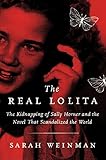 The Real Lolita by Sarah Weinman: Sarah Weinman uncovers that Sally Horner, an 11-year-old girl who was kidnapped in 1948, was the inspiration for Vladimir Nabokov’s Lolita. Through her thorough research, Weinman learns that Nabokov knew much about Horner’s case and made efforts to disguise this fact. Megan Abbott writes that The Real Lolita “offers both nuanced and compassionate true-crime reportage and revelatory cultural and literary history. It will, quite simply, change the way you think about Lolita and ‘Lolitas’ forever.” (Zoë)
The Real Lolita by Sarah Weinman: Sarah Weinman uncovers that Sally Horner, an 11-year-old girl who was kidnapped in 1948, was the inspiration for Vladimir Nabokov’s Lolita. Through her thorough research, Weinman learns that Nabokov knew much about Horner’s case and made efforts to disguise this fact. Megan Abbott writes that The Real Lolita “offers both nuanced and compassionate true-crime reportage and revelatory cultural and literary history. It will, quite simply, change the way you think about Lolita and ‘Lolitas’ forever.” (Zoë)
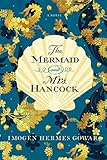 The Mermaid and Mrs. Hancock by Imogen Hermes Gowar: Shortlisted for the Women’s Prize for Fiction, Gowar’s debut novel features a prosperous merchant whose life is thrown into chaos when he receives a mermaid and meets a mysterious, older woman. In a starred review, Kirkus describes the the novel as ambitious “with enough romance, intrigue, and social climbing to fill a mermaid’s grotto to the brim.” (Carolyn)
The Mermaid and Mrs. Hancock by Imogen Hermes Gowar: Shortlisted for the Women’s Prize for Fiction, Gowar’s debut novel features a prosperous merchant whose life is thrown into chaos when he receives a mermaid and meets a mysterious, older woman. In a starred review, Kirkus describes the the novel as ambitious “with enough romance, intrigue, and social climbing to fill a mermaid’s grotto to the brim.” (Carolyn)
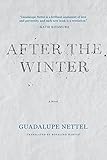 After the Winter by Guadalupe Nettel (translated by Rosalind Harvey): A story about love and consciousness that takes place in Havana, Paris, and New York, by the Mexican author who Katie Kitamura called “a brilliant anatomist of love and perversity…each new book is a revelation.” (Lydia)
After the Winter by Guadalupe Nettel (translated by Rosalind Harvey): A story about love and consciousness that takes place in Havana, Paris, and New York, by the Mexican author who Katie Kitamura called “a brilliant anatomist of love and perversity…each new book is a revelation.” (Lydia)
 The Diary of a Bookseller by Shaun Bythell: A runaway hit in the UK already, this memoir of bookselling in remote Scotland is now published in the U.S. by Melville House. Dwight Garner called it “Among the most irascible and amusing bookseller memoirs I’ve read.”
The Diary of a Bookseller by Shaun Bythell: A runaway hit in the UK already, this memoir of bookselling in remote Scotland is now published in the U.S. by Melville House. Dwight Garner called it “Among the most irascible and amusing bookseller memoirs I’ve read.”
 Heartland: A Memoir of Working Hard and Being Broke by Sarah Smarsh: An uncomfortable reality of contemporary American society, one of many, is that where social mobility is concerned, the so-called American Dream is best achieved in Denmark. If you’re born into poverty here, in other words, hard work won’t necessarily pull you out. In Heartland, Smarsh blends memoir—she comes from a long line of teen mothers and was raised primarily by her grandmother on a farm near Wichita—with analysis and social commentary to offer a nuanced exploration of the impact of generational poverty and a look at the lives of poor and working-class Americans. (Emily)
Heartland: A Memoir of Working Hard and Being Broke by Sarah Smarsh: An uncomfortable reality of contemporary American society, one of many, is that where social mobility is concerned, the so-called American Dream is best achieved in Denmark. If you’re born into poverty here, in other words, hard work won’t necessarily pull you out. In Heartland, Smarsh blends memoir—she comes from a long line of teen mothers and was raised primarily by her grandmother on a farm near Wichita—with analysis and social commentary to offer a nuanced exploration of the impact of generational poverty and a look at the lives of poor and working-class Americans. (Emily)
 Writers Under Surveillance: The FBI Files by MIT Press (ed., JPat Brown, B. C. D. Lipton, and Michael Morisy): Obtained through Freedom of Information Act requests by MuckRock, a nonfiction dedicated to increasing government transparency, this collection reveals former FBI investigations against writers such as James Baldwin, Hannah Arendt, and Allen Ginsberg. (Carolyn)
Writers Under Surveillance: The FBI Files by MIT Press (ed., JPat Brown, B. C. D. Lipton, and Michael Morisy): Obtained through Freedom of Information Act requests by MuckRock, a nonfiction dedicated to increasing government transparency, this collection reveals former FBI investigations against writers such as James Baldwin, Hannah Arendt, and Allen Ginsberg. (Carolyn)
 The Dictionary of Animal Languages by Heidi Sopinka: A novel based on the life of the surrealist painter Leonora Carrington, who Sopinka interviewed for The Believer before the artist’s death. Our own Claire Cameron said of the book, “With stunning prose, lavish details, deep wisdom, and emotional precision, reading this book is like falling in love–my interest in everything else was lost.” (Lydia)
The Dictionary of Animal Languages by Heidi Sopinka: A novel based on the life of the surrealist painter Leonora Carrington, who Sopinka interviewed for The Believer before the artist’s death. Our own Claire Cameron said of the book, “With stunning prose, lavish details, deep wisdom, and emotional precision, reading this book is like falling in love–my interest in everything else was lost.” (Lydia)
 These Truths by Jill Lepore: A one-volume history of the United States by the brilliant writer and historian, focusing on the promises and contradictions of the republic. Henry Louis Gates Jr. says “With this epic work of grand chronological sweep, brilliantly illuminating the idea of truth in the history of our republic, Lepore reaffirms her place as one of one of the truly great historians of our time.” (Lydia)
These Truths by Jill Lepore: A one-volume history of the United States by the brilliant writer and historian, focusing on the promises and contradictions of the republic. Henry Louis Gates Jr. says “With this epic work of grand chronological sweep, brilliantly illuminating the idea of truth in the history of our republic, Lepore reaffirms her place as one of one of the truly great historians of our time.” (Lydia)
 My Pet Serial Killer by Michael Seidlinger: Writer and Electric Literature alumnus Seidlinger has written a horror novel that Alissa Nutting calls “A rowdy menagerie of the unexpected, this book will delight and disturb even the bravest of readers; all preconceptions of what to trust and what to fear are masterfully upended.” (Lydia)
My Pet Serial Killer by Michael Seidlinger: Writer and Electric Literature alumnus Seidlinger has written a horror novel that Alissa Nutting calls “A rowdy menagerie of the unexpected, this book will delight and disturb even the bravest of readers; all preconceptions of what to trust and what to fear are masterfully upended.” (Lydia)
 A Key to Treehouse Living by Elliot Reed: A novel in glossary form narrated by an orphan growing up in the midwest. Joy Williams calls the book, “Disorienting, weirdly wise, indescribably transparent, impossibly recognizable. Fun, too.” (Lydia)
A Key to Treehouse Living by Elliot Reed: A novel in glossary form narrated by an orphan growing up in the midwest. Joy Williams calls the book, “Disorienting, weirdly wise, indescribably transparent, impossibly recognizable. Fun, too.” (Lydia)
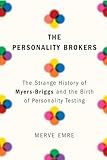 The Personality Brokers by Merve Emre: The Myers-Briggs personality test is the most popular test of its kind in the world, and affects life in ways large and small–from the hiring and career development practices of Fortune 500 companies, to time-wasting Facebook tests to, amazingly, people’s Twitter bios. (I’m allegedly an ENFP, incidentally.) As it happens, the test was contrived by a team of mother-daughter novelists with a Jung obsession. Scholar and trenchant literary critic Emre uses archival research to tell this story, revealing the fictions woven into a supposedly “scientific” instrument. (Lydia)
The Personality Brokers by Merve Emre: The Myers-Briggs personality test is the most popular test of its kind in the world, and affects life in ways large and small–from the hiring and career development practices of Fortune 500 companies, to time-wasting Facebook tests to, amazingly, people’s Twitter bios. (I’m allegedly an ENFP, incidentally.) As it happens, the test was contrived by a team of mother-daughter novelists with a Jung obsession. Scholar and trenchant literary critic Emre uses archival research to tell this story, revealing the fictions woven into a supposedly “scientific” instrument. (Lydia)
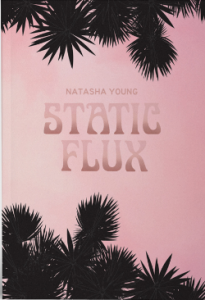 Static Flux by Natasha Young: From the streets of Brooklyn to the hills of Los Angeles, this witty debut novel follows Calla—a millennial with a personality disorder—as she leaves post-Great Recession New York for LA after failing to make it as a writer. (Carolyn)
Static Flux by Natasha Young: From the streets of Brooklyn to the hills of Los Angeles, this witty debut novel follows Calla—a millennial with a personality disorder—as she leaves post-Great Recession New York for LA after failing to make it as a writer. (Carolyn)
